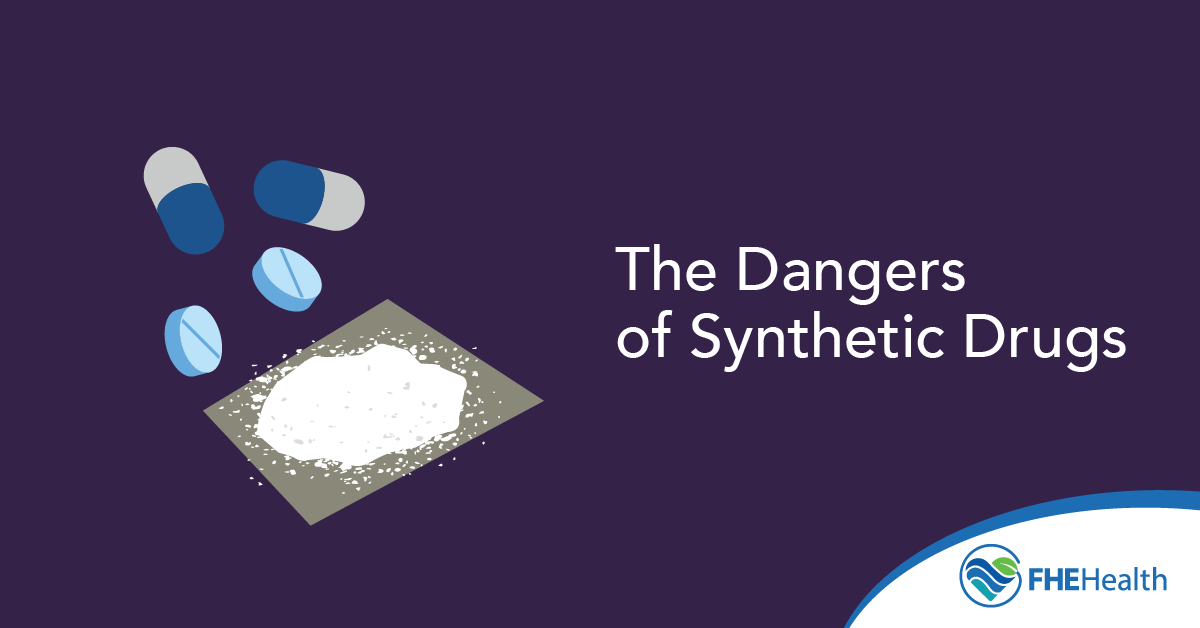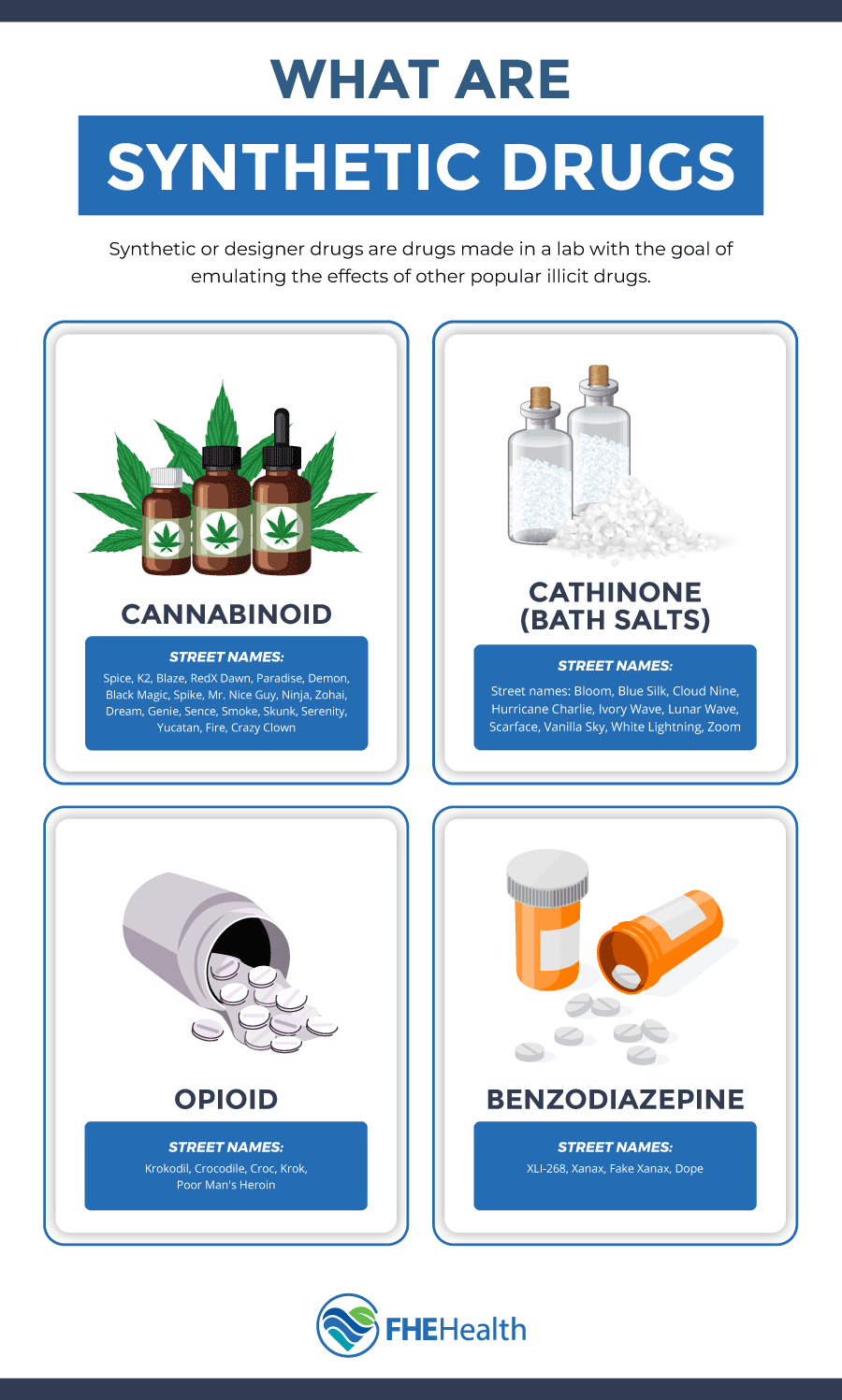
The media frenzy around synthetic or designer drugs is constant, but drug use isn’t a new phenomenon. There are records of ancient cultures using plants for their psychedelic properties as early as 10,000 years ago. Cannabis, cocaine, heroin and LSD are all substances our parents and grandparents will have at least heard of. Today, the market is awash with synthetic drugs as dealers look to cut costs, evade law enforcement and draw in new consumers. But what are designer drugs, and what makes them so appealing?
What Are Synthetic Drugs, and Why Are They So Popular?
Put simply, synthetic drugs are drugs made in a lab with the goal of emulating the effects of other popular illicit drugs. Designer drugs have a chemical makeup similar to the drugs they emulate, but they’ve been modified so they’re no longer classified as illegal. In some cases, altering the chemical makeup of a drug can even make it not show up on conventional drug tests. This makes designer drugs appealing to a wider market.
Today, there are more than 200 known synthetic drug compounds and more than 90 different synthetic marijuana compounds. These drugs are marketed in a variety of different ways. In some cases, they’re sold as legal highs or a more powerful alternative to their “natural” counterparts. In other cases, synthetic drugs are used to bulk out traditional drugs or even replace them. Buyers think they’re getting something else and have no idea they’re taking a drug that was made in a lab.
The Synthetic Drug Abuse Prevention Act Explained
The Synthetic Drug Abuse Prevention Act of 2012 is a part of the FDA Safety and Innovation Act that was signed into law by President Obama. The act was a response to the growing issue of synthetic drug abuse in the United States.
The law classified 15 synthetic cannabinoids (known on the streets as “Spice”) and 11 synthetic cathinones (known as “bath salts”) as illegal drugs under Schedule I of the Controlled Substances Act. This means it’s now illegal to use, possess or distribute those drugs.
While the Synthetic Drug Abuse Prevention Act was a big step forward in the fight against synthetic drugs, it wasn’t a complete solution. Drug makers are constantly looking for loopholes and opportunities to bring new synthetic psychoactive substances to market.
Examples of Synthetic or Designer Drugs
The U.S. Drug Enforcement Administration recognizes seven different types of designer drugs:
- Cannabinoids
- Phenethylamines
- Phencyclidines
- Tryptamines
- Piperazines
- Pipradrols
- N-ring systems
These broad categories cover most of the substances on the market. Because these drugs are developed and manufactured in clandestine laboratories, it’s not always possible to work out the makeup, strength and effects of new drugs to test for them. However, these are some of the common designer drugs and their street names.
- Spice/Skunk
Spice is a mixture of herbs and chemicals designed to give a powerful high. The chemicals used can vary, making the strength and effects difficult to predict. Spice is often sold as “incense” and is relatively inexpensive, making it popular with teenagers. Many young people have required medical treatment after accidentally overdosing on Spice. - Bath Salts
This popular designer drug looks innocent on the surface. The crystals or powder are designed to be snorted or smoked and can produce powerful hallucinations, leading to uncharacteristic violent behavior. The drug has also been found to cause a sudden spike in body temperature, which can lead to dehydration and organ failure. - Krokodil
A powerful narcotic, krokodil is marketed as an inexpensive alternative to heroin. This drug is incredibly dangerous and has fallen out of favor in many parts of the world because one of the side effects it causes is severe necrosis. - Fake Xanax/Dope
To older generations, “dope” referred to cannabis. Today, the term is sometimes used to refer to bromazolam, one of many designer benzodiazepines. These drugs are often used in combination with other illicit substances, increasing the risk of an overdose.
The Risks Associated With Synthetic Drugs
Synthetic drugs pose a significant risk to people’s health for several reasons. Many of these substances are manufactured abroad or in clandestine factories in the United States with no oversight. Unlike businesses manufacturing foods and drugs that are regulated by the FDA, synthetic drug manufacturers aren’t subject to any form of quality control. The purity of the ingredients and the strength of the drug are unknown and could change between batches.
The drugs themselves are also untested. Manufacturers rush to make new designer drugs and bring them to market, but there’s no formal research into short- or long-term side effects. The consumers who buy and use these drugs are the guinea pigs and could be putting their lives at risk.
Common side effects seen by users of synthetic drugs include:
- Nausea and vomiting
- Agitation and anxiety
- Tachycardia
- High blood pressure
- Tremors
- Seizures
- Chest pain
- Hallucinations
- Paranoia
- Delusions
- Violent behavior
- Suicidal thoughts
Some synthetic drugs are designed to emulate older “natural” drugs, but the synthetic versions are often designed to be much stronger. If someone is abusing a drug, such as khat or heroin, and takes a synthetic version expecting a similar experience, they could overdose, with potentially dangerous effects.
There’s another risk to designer drugs that gets less attention than the health impacts, and that’s the impact on a person’s career. Until relatively recently, testing for synthetic drug compounds was uncommon. Designer drugs were marketed as a way to get high without putting your job at risk. Now that awareness of designer drugs is higher, many companies are testing for synthetic cannabinoids and cathinones, so people who use Spice or bath salts are putting their jobs at risk.
Designer Drugs Can Have Unglamorous Consequences
It’s easy to understand why young people are drawn to the idea of designer drugs. These substances are marketed as offering legal highs, and they’re tailored to be strong and addictive. However, the marketing hype conceals an ugly reality: The drugs are untested, the market is unregulated and there’s nobody to turn to if things go wrong. An overdose or a bad batch could have life-altering consequences.
If you or someone close to you is experimenting with designer drugs, get help as soon as possible to break free from addiction. Many people who are taking these drugs are unaware that they can be incredibly dangerous, and getting informed is the first step toward returning to a healthier lifestyle.
The team at FHE Health is here to offer confidential, nonjudgmental support for people struggling with drug addiction. Contact us today to learn more about our treatment options.







